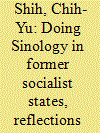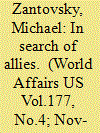|
|
|
Sort Order |
|
|
|
Items / Page
|
|
|
|
|
|
|
| Srl | Item |
| 1 |
ID:
134718


|
|
|
|
|
| Summary/Abstract |
Czech politics suffers from a low durability of most of its governments, and frequent government crises. One of the products of this situation has been the phenomenon of caretaker governments. This article analyses why political elites have resorted to this solution, and discusses how this has reflected an older Czech tradition. Two cases of such governments are analysed in detail. The Tošovský government was characterised by the ability of the Czech president to advance his agenda through this government at a time when the party elites were divided. The Fischer government was characterised by the considerably higher role of parties that shaped and limited the agenda of the cabinet, and the president played a more static role.
|
|
|
|
|
|
|
|
|
|
|
|
|
|
|
|
| 2 |
ID:
134966


|
|
|
|
|
| Summary/Abstract |
Justification in public discourse is an inevitable part of the process when states attempt to regulate accelerating markets. In this process, policymakers define problems to be solved and attribute values to good policy. Those qualities are constantly negotiated, and to analyse them is essential for understanding the processes and ways different actors take control of political debates. This article examines a public discussion on health reform in the Czech Republic between 2006 and 2008. At that time, the government tried to promote a comprehensive reform for cost containment. The reform corresponded with a shift from a social democratic state paradigm to a neoliberal paradigm in health-care provision which can be observed also in other post-communist countries. In this case, controlling health-care costs gained a top priority in a discourse driven by the combination of factors including scarcity, the ageing of the population and patient responsibility. The authors of the reform used a “funnel strategy” where an original broader set of issues was narrowed to predominantly the economic aspects of reform. The wasting of money in health care was associated primarily with personal patient responsibility. While the distribution of care provided by hospital professionals was considered reasonable, the way in which patients consumed health care was questioned. This categorization replicated dominant media representations of professional medicine as a way to treat sickness competently and successfully by doctors in hospitals using the latest technology and fast-acting drugs
|
|
|
|
|
|
|
|
|
|
|
|
|
|
|
|
| 3 |
ID:
135419


|
|
|
|
|
| Summary/Abstract |
The study of China in each of the former socialist states has a long tradition in the humanities. Before the socialist period, the philological tradition was based largely on the legacy of French sinology. During the
socialist period, China Studies adopted scientific principles in accordance with Marxist perspectives, but these were primarily superimposed without any intellectual roots among sinologists. Such was the case in
Czechoslovakia, Mongolia, Poland, Russia, Vietnam, and the other socialist environments. The humanities were considered part of scientific research, thus making for a situation quite different from that in Western, primarily American, institutions of higher education, where the social sciences and the humanities were two different kinds of basic research, with their own epistemological assumptions and methodological approaches.
|
|
|
|
|
|
|
|
|
|
|
|
|
|
|
|
| 4 |
ID:
134844


|
|
|
|
|
| Summary/Abstract |
During the Czech Republic’s first year of existence, most Czechs felt that nothing much had happened. True, there was now a new country east of the Morava River, where they had previously gone to hike and ski without the need of a passport. But nothing had changed within the Czech lands, Bohemia, Moravia, and a stump of Silesia. They were still there, as they had been for a thousand years, a country of milk and honey, hardworking, peaceful people, known around the world for their skills, intelligence, and culture.
|
|
|
|
|
|
|
|
|
|
|
|
|
|
|
|
| 5 |
ID:
134599


|
|
|
|
|
| Summary/Abstract |
This paper investigates reverse knowledge transfer of foreign multinational subsidiaries in Central and Eastern Europe (Czech Republic, Poland and Hungary) in the light of the current political and economic transformations of these former communist countries. The study examines whether foreign subsidiaries in the region share their knowledge base with their sister-subsidiaries and parent company, and the role of various factors in this knowledge sharing. These factors include subsidiary initiative, subsidiary autonomy, local dynamism and corporate embeddedness. A proprietary dataset is used for statistical analysis.
|
|
|
|
|
|
|
|
|
|
|
|
|
|
|
|
|
|
|
|
|